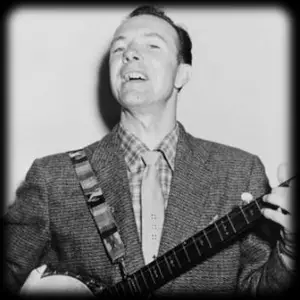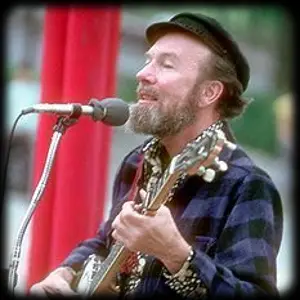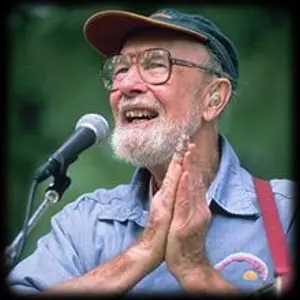PETE SEEGER
 Pete Seeger was part of a politicised, multi-cultural music community in New York after WWII, that played a important rôle in the popular fight against injustice, not just in America, but all over the world. His live and recorded performances, his songwriting and his political activism made him famous and his collaborations with other musicians, notably with Piedmont Blues singers like Josh White and Sonny Terry & Brownie McGhee, won him deep respect.
Pete Seeger was part of a politicised, multi-cultural music community in New York after WWII, that played a important rôle in the popular fight against injustice, not just in America, but all over the world. His live and recorded performances, his songwriting and his political activism made him famous and his collaborations with other musicians, notably with Piedmont Blues singers like Josh White and Sonny Terry & Brownie McGhee, won him deep respect.
Pete leads the audience in ‘We Shall Overcome’;
 In 1950, his band morphed into The Weavers and almost immediately topped the singles charts with a version of Lead Belly‘s ‘Goodnight Irene’. The Weavers got into political trouble in the McCarthy era, when their early ‘protest songs’ were seen as showing communist sympathies, but Pete’s strong character led him to stand up to Congress over the accusations, and he resigned from the band when they agreed to record an advertising jingle for cigarettes. The banjo was Pete’s favoured instrument in his solo career: he ‘invented’ a long-necked version and wrote an influential book of instruction, but he also used the 12-string guitar to good effect. Pete’s powerful songs of changing times like ‘Turn, Turn, Turn’ and the anti-War number ‘Where Have All the Flowers Gone?’ were anthems of the early 60s protest movement. In 1963, the old spiritual ‘We Shall Overcome’, which Pete had first publicised in his magazine bulletin ‘Sing Out’ many years before, became the sound of the Civil Rights Movement. From the mid-60s, Pete hosted the network TV show ‘Rainbow Quest’, featuring Folk and Blues musicians like Mississippi John Hurt, Libba Cotten, Rev. Gary Davis and Sonny Terry & Brownie McGhee.
In 1950, his band morphed into The Weavers and almost immediately topped the singles charts with a version of Lead Belly‘s ‘Goodnight Irene’. The Weavers got into political trouble in the McCarthy era, when their early ‘protest songs’ were seen as showing communist sympathies, but Pete’s strong character led him to stand up to Congress over the accusations, and he resigned from the band when they agreed to record an advertising jingle for cigarettes. The banjo was Pete’s favoured instrument in his solo career: he ‘invented’ a long-necked version and wrote an influential book of instruction, but he also used the 12-string guitar to good effect. Pete’s powerful songs of changing times like ‘Turn, Turn, Turn’ and the anti-War number ‘Where Have All the Flowers Gone?’ were anthems of the early 60s protest movement. In 1963, the old spiritual ‘We Shall Overcome’, which Pete had first publicised in his magazine bulletin ‘Sing Out’ many years before, became the sound of the Civil Rights Movement. From the mid-60s, Pete hosted the network TV show ‘Rainbow Quest’, featuring Folk and Blues musicians like Mississippi John Hurt, Libba Cotten, Rev. Gary Davis and Sonny Terry & Brownie McGhee.
Pete and Doc Watson ‘Walk that Lonesome Valley’;
 The Vietnam War and the destruction of the environment loomed large in Pete’s recordings in the late 60s, and Peace, Freedom and Ecology had always been his major concerns. With a recorded output of almost 60 albums, Pete has left a legacy of outstanding music, not only based on his love of Americana, but with African, Caribbean and European influences too. The example Pete displayed to younger musicians like Bob Dylan, Bruce Springsteen and many more, was one of courage, determination and persistance. The 2007 documentary film of Pete’s life was titled ‘The Power of Music’, and Pete’s songs had the power to move the World.
The Vietnam War and the destruction of the environment loomed large in Pete’s recordings in the late 60s, and Peace, Freedom and Ecology had always been his major concerns. With a recorded output of almost 60 albums, Pete has left a legacy of outstanding music, not only based on his love of Americana, but with African, Caribbean and European influences too. The example Pete displayed to younger musicians like Bob Dylan, Bruce Springsteen and many more, was one of courage, determination and persistance. The 2007 documentary film of Pete’s life was titled ‘The Power of Music’, and Pete’s songs had the power to move the World.
